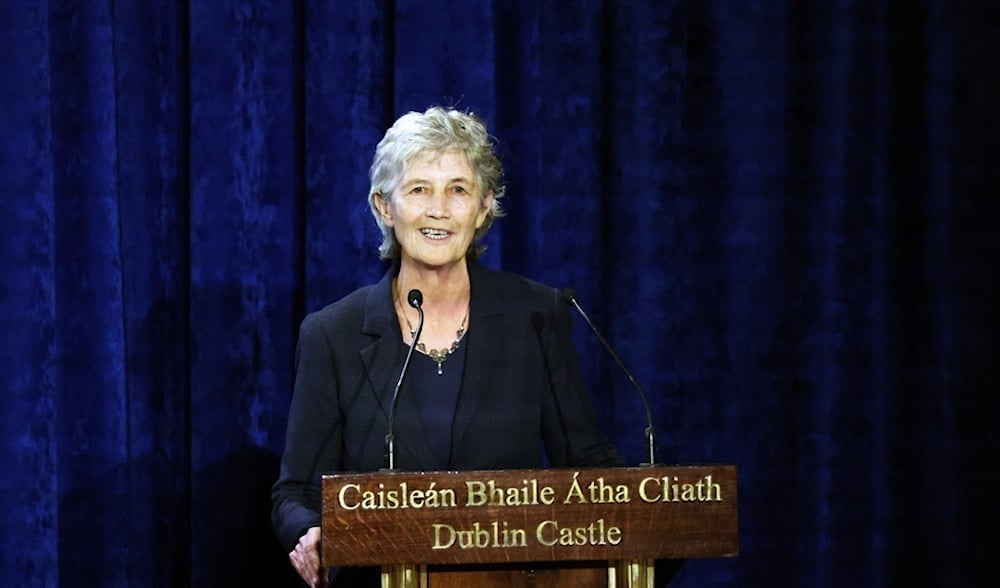Connolly wins Irish presidency in blow to political establishment
Independent left-wing MP Catherine Connolly won Ireland’s presidency in a landslide. Despite her win, low turnout and protest votes suggest a complex political message.
-

Catherine Connolly speaks after being elected as the new President of Ireland at Dublin Castle, Ireland, Saturday, Oct. 25, 2025 (AP)
Catherine Connolly has been elected president of Ireland in a resounding landslide, marking a historic moment for left-wing politics in Ireland but falling short of a decisive ideological shift in the country’s political direction.
Connolly, a 68-year-old independent lawmaker from Galway, won over 64% of the vote in Ireland’s presidential election, which surprised observers and humiliated the dominant centre-right parties Fine Gael and Fianna Fáil.
When she launched her candidacy in July, Connolly was viewed as an outsider: a soft-spoken parliamentarian with limited national visibility. Backed initially by small opposition parties such as the Social Democrats, Labour, and People Before Profit, she later gained the critical support of Sinn Féin, which chose not to field its own candidate.
Despite the broad but loosely aligned coalition, few predicted the scale of her success. Ireland’s electoral system allows voters to rank candidates by preference, which was expected to favor the establishment parties. Instead, Connolly’s popularity cut across age groups and regions, especially among younger voters, securing a first-preference landslide.
How did Connolly secure her victory?
An analysis by The Guardian explains that Connolly’s victory was aided not just by campaign agility and viral moments but also by strategic and candidate missteps from the ruling parties. Fianna Fáil’s Jim Gavin dropped out of the race late due to a financial scandal, but his name remained on the ballot, deflating enthusiasm among the party base.
Fine Gael turned to Heather Humphreys after their first choice, Mairead McGuinness, withdrew for health reasons. However, Humphreys failed to energize voters.
This left Connolly as the standout figure in a race some voters viewed with cynicism or disinterest. Her energetic grassroots campaign and personal appeal as a principled outsider resonated in contrast to the establishment’s faltering efforts.
A shift in tone, not in power
According to The Guardian, Connolly’s win is politically significant, but it does not equate to a national shift to the left. While the presidency in Ireland is largely ceremonial, recent occupants, including Mary Robinson, Mary McAleese, and Michael D. Higgins, have shaped public discourse through symbolic acts and moral leadership.
Connolly has expressed strong views on Irish neutrality, European militarism, and global justice, but she has also pledged to respect constitutional limits.
International comparisons to figures like Jeremy Corbyn have emerged, yet Connolly has distanced herself from being a Sinn Féin instrument or figurehead for Irish unification. The issue was largely absent from the campaign, and Connolly has shown little personal interest in pursuing it as a national agenda.
Political discontent takes over elections
Despite the historic result, turnout was notably low, estimated at 46%, and the election saw a record number of spoiled ballots. Many voters, frustrated by the lack of a strong conservative or alternative candidate, deliberately invalidated their votes.
Critics of the race lamented a narrow field that failed to reflect broader public concerns, including immigration and national identity. Connolly’s win, while clear, does not represent unanimous public enthusiasm, but rather a confluence of anti-establishment sentiment, tactical opposition unity, and establishment disarray.
Catherine Connolly's rise to the presidency is a powerful statement on the current state of Irish politics. Her supporters speak of a movement, and opposition parties may be inspired to form a more coherent front in future general elections. Yet, with low turnout and deep voter skepticism, Ireland’s political transformation, if it is coming, remains incomplete.
Read more: Irish contender blasts Irish gov. over delay of sanctions on 'Israel'

 4 Min Read
4 Min Read









